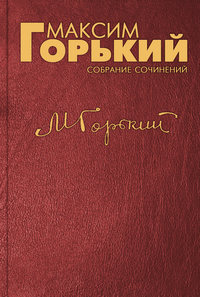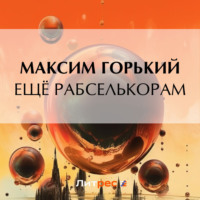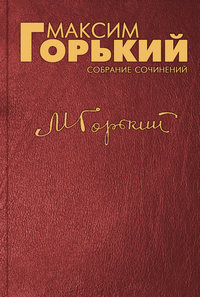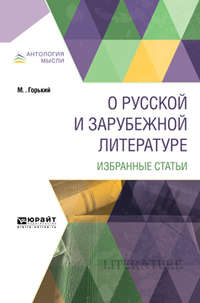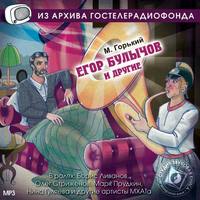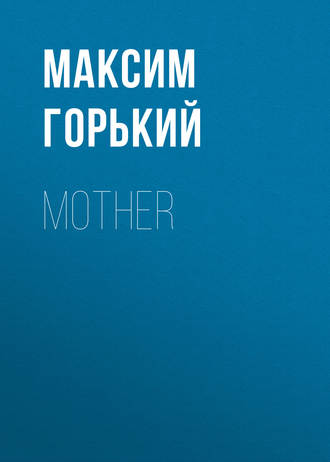 полная версия
полная версияMother
The older brother of Bukin, a tall, red-faced fellow, waved his hands and turned about rapidly in all directions.
"The district elder Klepanov has no place in this case," he declared aloud.
"Keep still, Konstantin!" his father, a little old man, tried to dissuade him, and looked around cautiously.
"No; I'm going to speak out! There's a rumor afloat about him that last year he killed a clerk of his on account of the clerk's wife. What kind of a judge is he? permit me to ask. He lives with the wife of his clerk – what have you got to say to that? Besides, he's a well-known thief!"
"Oh, my little father – Konstantin!"
"True!" said Samoylov. "True, the court is not a very just one."
Bukin heard his voice and quickly walked up to him, drawing the whole crowd after him. Red with excitement, he waved his hands and said:
"For thievery, for murder, jurymen do the trying. They're common people, peasants, merchants, if you please; but for going against the authorities you're tried by the authorities. How's that?"
"Konstantin! Why are they against the authorities? Ah, you! They – "
"No, wait! Fedor Mazin said the truth. If you insult me, and I land you one on your jaw, and you try me for it, of course I'm going to turn out guilty. But the first offender – who was it? You? Of course, you!"
The watchman, a gray man with a hooked nose and medals on his chest, pushed the crowd apart, and said to Bukin, shaking his finger at him:
"Hey! don't shout! Don't you know where you are? Do you think this is a saloon?"
"Permit me, my cavalier, I know where I am. Listen! If I strike you and you me, and I go and try you, what would you think?"
"And I'll order you out," said the watchman sternly.
"Where to? What for?"
"Into the street, so that you shan't bawl."
"The chief thing for them is that people should keep their mouths shut."
"And what do you think?" the old man bawled. Bukin threw out his hands, and again measuring the public with his eyes, began to speak in a lower voice:
"And again – why are the people not permitted to be at the trial, but only the relatives? If you judge righteously, then judge in front of everybody. What is there to be afraid of?"
Samoylov repeated, but this time in a louder tone:
"The trial is not altogether just, that's true."
The mother wanted to say to him that she had heard from Nikolay of the dishonesty of the court; but she had not wholly comprehended Nikolay, and had forgotten some of his words. While trying to recall them she moved aside from the people, and noticed that somebody was looking at her – a young man with a light mustache. He held his right hand in the pocket of his trousers, which made his left shoulder seem lower than the right, and this peculiarity of his figure seemed familiar to the mother. But he turned from her, and she again lost herself in the endeavor to recollect, and forgot about him immediately. In a minute, however, her ear was caught by the low question:
"This woman on the left?"
And somebody in a louder voice cheerfully answered:
"Yes."
She looked around. The man with the uneven shoulders stood sidewise toward her, and said something to his neighbor, a black-bearded fellow with a short overcoat and boots up to his knees.
Again her memory stirred uneasily, but did not yield any distinct results.
The watchman opened the door of the hall, and shouted:
"Relatives, enter; show your tickets!"
A sullen voice said lazily:
"Tickets! Like a circus!"
All the people now showed signs of a dull excitement, an uneasy passion. They began to behave more freely, and hummed and disputed with the watchman.
Sitting down on the bench, Sizov mumbled something to the mother.
"What is it?" asked the mother.
"Oh, nothing – the people are fools! They know nothing; they live groping about and groping about."
The bellman rang; somebody announced indifferently:
"The session has begun!"
Again all arose, and again, in the same order, the judges filed in and sat down; then the prisoners were led in.
"Pay attention!" whispered Sizov; "the prosecuting attorney is going to speak."
The mother craned her neck and extended her whole body. She yielded anew to expectation of the horrible.
Standing sidewise toward the judges, his head turned to them, leaning his elbow on the desk, the prosecuting attorney sighed, and abruptly waving his right hand in the air, began to speak:
The mother could not make out the first words. The prosecuting attorney's voice was fluent, thick; it sped on unevenly, now a bit slower, now a bit faster. His words stretched out in a thin line, like a gray seam; suddenly they burst out quickly and whirled like a flock of black flies around a piece of sugar. But she did not find anything horrible in them, nothing threatening. Cold as snow, gray as ashes, they fell and fell, filling the hall with something which recalled a slushy day in early autumn. Scant in feeling, rich in words, the speech seemed not to reach Pavel and his comrades. Apparently it touched none of them; they all sat there quite composed, smiling at times as before, and conversed without sound. At times they frowned to cover up their smiles.
"He lies!" whispered Sizov.
She could not have said it. She understood that the prosecuting attorney charged all the comrades with guilt, not singling out any one of them. After having spoken about Pavel, he spoke about Fedya, and having put him side by side with Pavel, he persistently thrust Bukin up against them. It seemed as if he packed and sewed them into a sack, piling them up on top of one another. But the external sense of his words did not satisfy, did not touch, did not frighten her. She still waited for the horrible, and rigorously sought something beyond his words – something in his face, his eyes, his voice, in his white hand, which slowly glided in the air. Something terrible must be there; she felt it, but it was impalpable; it did not yield to her consciousness, which again covered her heart with a dry, pricking dust.
She looked at the judges. There was no gainsaying that they were bored at having to listen to this speech. The lifeless, yellow faces expressed nothing. The sickly, the fat, or the extremely lean, motionless dead spots all grew dimmer and dimmer in the dull ennui that filled the hall. The words of the prosecuting attorney spurted into the air like a haze imperceptible to the eye, growing and thickening around the judges, enveloping them more closely in a cloud of dry indifference, of weary waiting. At times one of them changed his pose; but the lazy movement of the tired body did not rouse their drowsy souls. The oldest judge did not stir at all; he was congealed in his erect position, and the gray blots behind the eyeglasses at times disappeared, seeming to spread over his whole face. The mother realized this dead indifference, this unconcern without malice in it, and asked herself in perplexity, "Are they judging?"
The question pressed her heart, and gradually squeezed out of it her expectation of the horrible. It pinched her throat with a sharp feeling of wrong.
The speech of the prosecuting attorney snapped off unexpectedly. He made a few quick, short steps, bowed to the judges, and sat down, rubbing his hands. The marshal of the nobility nodded his head to him, rolling his eyes; the city mayor extended his hand, and the district elder stroked his belly and smiled.
But the judges apparently were not delighted by the speech, and did not stir.
"The scabby devil!" Sizov whispered the oath.
"Next," said the old judge, bringing the paper to his face, "lawyers for the defendants, Fedoseyev, Markov, Zagarov."
The lawyer whom the mother had seen at Nikolay's arose. His face was broad and good-natured; his little eyes smiled radiantly and seemed to thrust out from under his eyebrows two sharp blades, which cut the air like scissors. He spoke without haste, resonantly, and clearly; but the mother was unable to listen to his speech. Sizov whispered in her ear:
"Did you understand what he said? Did you understand? 'People,' he says, 'are poor, they are all upset, insensate.' Is that Fedor? He says they don't understand anything; they're savages."
The feeling of wrong grew, and passed into revolt. Along with the quick, loud voice of the lawyer, time also passed more quickly.
"A live, strong man having in his breast a sensitive, honest heart cannot help rebelling with all his force against this life so full of open cynicism, corruption, falsehood, and so blunted by vapidity. The eyes of honest people cannot help seeing such glaring contradictions – "
The judge with the green face bent toward the president and whispered something to him; then the old man said dryly:
"Please be more careful!"
"Ha!" Sizov exclaimed softly.
"Are they judging?" thought the mother, and the word seemed hollow and empty as an earthen vessel. It seemed to make sport of her fear of the terrible.
"They're a sort of dead body," she answered the old man.
"Don't fear; they're livening up."
She looked at them, and she actually saw something like a shadow of uneasiness on the faces of the judges. Another man was already speaking, a little lawyer with a sharp, pale, satiric face. He spoke very respectfully:
"With all due respect, I permit myself to call the attention of the court to the solid manner of the honorable prosecuting attorney, to the conduct of the safety department, or, as such people are called in common parlance, spies – "
The judge with the green face again began to whisper something to the president. The prosecuting attorney jumped up. The lawyer continued without changing his voice:
"The spy Gyman tells us about the witness: 'I frightened him.' The prosecuting attorney also, as the court has heard, frightened witnesses; as a result of which act, at the insistence of the defense, he called forth a rebuke from the presiding judge."
The prosecuting attorney began to speak quickly and angrily; the old judge followed suit; the lawyer listened to them respectfully, inclining his head. Then he said:
"I can even change the position of my words if the prosecuting attorney deems it is not in the right place; but that will not change the plan of my defense. However, I cannot understand the excitement of the prosecuting attorney."
"Go for him!" said Sizov. "Go for him, tooth and nail! Pick him open down to his soul, wherever that may be!"
The hall became animated; a fighting passion flared up; the defense attacked from all sides, provoking and disturbing the judges, driving away the cold haze that enveloped them, pricking the old skin of the judges with sharp words. The judges had the air of moving more closely to one another, or suddenly they would puff and swell, repulsing the sharp, caustic raps with the mass of their soft, mellow bodies. They acted as if they feared that the blow of the opponent might call forth an echo in their empty bosoms, might shake their resolution, which sprang not from their own will but from a will strange to them. Feeling this conflict, the people on the benches back of the mother sighed and whispered.
But suddenly Pavel arose; tense quiet prevailed. The mother stretched her entire body forward.
"A party man, I recognize only the court of my party and will not speak in my defense. According to the desire of my comrades, I, too, declined a defense. I will merely try to explain to you what you don't understand. The prosecuting attorney designated our coming out under the banner of the Social Democracy as an uprising against the superior power, and regarded us as nothing but rebels against the Czar. I must declare to you that to us the Czar is not the only chain that fetters the body of the country. We are obliged to tear off only the first and nearest chain from the people."
The stillness deepened under the sound of the firm voice; it seemed to widen the space between the walls of the hall. Pavel, by his words, removed the people to a distance from himself, and thereby grew in the eyes of the mother. His stony, calm, proud face with the beard, his high forehead, and blue eyes, somewhat stern, all became more dazzling and more prominent.
The judges began to stir heavily and uneasily; the marshal of the nobility was the first to whisper something to the judge with the indolent face. The judge nodded his head and turned to the old man; on the other side of him the sick judge was talking. Rocking back and forth in the armchair, the old judge spoke to Pavel, but his voice was drowned in the even, broad current of the young man's speech.
"We are Socialists! That means we are enemies to private property, which separates people, arms them against one another, and brings forth an irreconcilable hostility of interests; brings forth lies that endeavor to cover up, or to justify, this conflict of interests, and corrupt all with falsehood, hypocrisy and malice. We maintain that a society that regards man only as a tool for its enrichment is anti-human; it is hostile to us; we cannot be reconciled to its morality; its double-faced and lying cynicism. Its cruel relation to individuals is repugnant to us. We want to fight, and will fight, every form of the physical and moral enslavement of man by such a society; we will fight every measure calculated to disintegrate society for the gratification of the interests of gain. We are workers – men by whose labor everything is created, from gigantic machines to childish toys. We are people devoid of the right to fight for our human dignity. Everyone strives to utilize us, and may utilize us, as tools for the attainment of his ends. Now we want to have as much freedom as will give us the possibility in time to come to conquer all the power. Our slogan is simple: 'All the power for the people; all the means of production for the people; work obligatory on all. Down with private property!' You see, we are not rebels."
Pavel smiled, and the kindly fire of his blue eyes blazed forth more brilliantly.
"Please, more to the point!" said the presiding judge distinctly and aloud. He turned his chest to Pavel, and regarded him. It seemed to the mother that his dim left eye began to burn with a sinister, greedy fire. The look all the judges cast on her son made her uneasy for him. She fancied that their eyes clung to his face, stuck to his body, thirsted for his blood, by which they might reanimate their own worn-out bodies. And he, erect and tall, standing firmly and vigorously, stretched out his hand to them while he spoke distinctly:
"We are revolutionists, and will be such as long as private property exists, as long as some merely command, and as long as others merely work. We take stand against the society whose interests you are bidden to protect as your irreconcilable enemies, and reconciliation between us is impossible until we shall have been victorious. We will conquer – we workingmen! Your society is not at all so powerful as it thinks itself. That very property, for the production and preservation of which it sacrifices millions of people enslaved by it – that very force which gives it the power over us – stirs up discord within its own ranks, destroys them physically and morally. Property requires extremely great efforts for its protection; and in reality all of you, our rulers, are greater slaves than we – you are enslaved spiritually, we only physically. You cannot withdraw from under the weight of your prejudices and habits, the weight which deadens you spiritually; nothing hinders us from being inwardly free. The poisons with which you poison us are weaker than the antidote you unwittingly administer to our consciences. This antidote penetrates deeper and deeper into the body of workingmen; the flames mount higher and higher, sucking in the best forces, the spiritual powers, the healthy elements even from among you. Look! Not one of you can any longer fight for your power as an ideal! You have already expended all the arguments capable of guarding you against the pressure of historic justice. You can create nothing new in the domain of ideas; you are spiritually barren. Our ideas grow; they flare up ever more dazzling; they seize hold of the mass of the people, organizing them for the war of freedom. The consciousness of their great rôle unites all the workingmen of the world into one soul. You have no means whereby to hinder this renovating process in life except cruelty and cynicism. But your cynicism is very evident, your cruelty exasperates, and the hands with which you stifle us to-day will press our hands in comradeship to-morrow. Your energy, the mechanical energy of the increase of gold, separates you, too, into groups destined to devour one another. Our energy is a living power, founded on the ever-growing consciousness of the solidarity of all workingmen. Everything you do is criminal, for it is directed toward the enslavement of the people. Our work frees the world from the delusions and monsters which are produced by your malice and greed, and which intimidate the people. You have torn man away from life and disintegrated him. Socialism will unite the world, rent asunder by you, into one huge whole. And this will be!"
Pavel stopped for a second, and repeated in a lower tone, with greater emphasis, "This will be!"
The judges whispered to one another, making strange grimaces. And still their greedy looks were fastened on the body of Nilovna's son. The mother felt that their gaze tarnished this supple, vigorous body; that they envied its strength, power, freshness. The prisoners listened attentively to the speech of their comrade; their faces whitened, their eyes flashed joy. The mother drank in her son's words, which cut themselves into her memory in regular rows. The old judge stopped Pavel several times and explained something to him. Once he even smiled sadly. Pavel listened to him silently, and again began to speak in an austere but calm voice, compelling everybody to listen to him, subordinating the will of the judges to his will. This lasted for a long time. Finally, however, the old man shouted, extending his hand to Pavel, whose voice in response flowed on calmly, somewhat sarcastically.
"I am reaching my conclusion. To insult you personally was not my desire; on the contrary, as an involuntary witness to this comedy which you call a court trial, I feel almost compassion for you, I may say. You are human beings after all; and it is saddening to see human beings, even our enemies, so shamefully debased in the service of violence, debased to such a degree that they lose consciousness of their human dignity."
He sat down without looking at the judges.
Andrey, all radiant with joy, pressed his hand firmly; Samoylov, Mazin, and the rest animatedly stretched toward him. He smiled, a bit embarrassed by the transport of his comrades. He looked toward his mother, and nodded his head as if asking, "Is it so?"
She answered him all a-tremble, all suffused with warm joy.
"There, now the trial has begun!" whispered Sizov. "How he gave it to them! Eh, mother?"
CHAPTER XVI
She silently nodded her head and smiled, satisfied that her son had spoken so bravely, perhaps still more satisfied that he had finished. The thought darted through her mind that the speech was likely to increase the dangers threatening Pavel; but her heart palpitated with pride, and his words seemed to settle in her bosom.
Andrey arose, swung his body forward, looked at the judges sidewise, and said:
"Gentlemen of the defense – "
"The court is before you, and not the defense!" observed the judge of the sickly face angrily and loudly. By Andrey's expression the mother perceived that he wanted to tease them. His mustache quivered. A cunning, feline smirk familiar to her lighted up his eyes. He stroked his head with his long hands, and fetched a breath.
"Is that so?" he said, swinging his head. "I think not. That you are not the judges, but only the defendants – "
"I request you to adhere to what directly pertains to the case," remarked the old man dryly.
"To what directly pertains to the case? Very well! I've already compelled myself to think that you are in reality judges, independent people, honest – "
"The court has no need of your characterization."
"It has no need of such a characterization? Hey? Well, but after all I'm going to continue. You are men who make no distinction between your own and strangers. You are free people. Now, here two parties stand before you; one complains, 'He robbed me and did me up completely'; and the other answers, 'I have a right to rob and to do up because I have arms' – "
"Please don't tell anecdotes."
"Why, I've heard that old people like anecdotes – naughty ones in particular."
"I'll prohibit you from speaking. You may say something about what directly pertains to the case. Speak, but without buffoonery, without unbecoming sallies."
The Little Russian looked at the judges, silently rubbing his head.
"About what directly pertains to the case?" he asked seriously. "Yes; but why should I speak to you about what directly pertains to the case? What you need to know my comrade has told you. The rest will be told you; the time will come, by others – "
The old judge rose and declared:
"I forbid you to speak. Vasily Samoylov!"
Pressing his lips together firmly the Little Russian dropped down lazily on the bench, and Samoylov arose alongside of him, shaking his curly hair.
"The prosecuting attorney called my comrades and me 'savages,' 'enemies of civilization' – "
"You must speak only about that which pertains to your case."
"This pertains to the case. There's nothing which does not pertain to honest men, and I ask you not to interrupt me. I ask you what sort of a thing is your civilization?"
"We are not here for discussions with you. To the point!" said the old judge, showing his teeth.
Andrey's demeanor had evidently changed the conduct of the judges; his words seemed to have wiped something away from them. Stains appeared on their gray faces. Cold, green sparks burned in their eyes. Pavel's speech had excited but subdued them; it restrained their agitation by its force, which involuntarily inspired respect. The Little Russian broke away this restraint and easily bared what lay underneath. They looked at Samoylov, and whispered to one another with strange, wry faces. They also began to move extremely quickly for them. They gave the impression of desiring to seize him and howl while torturing his body with voluptuous ecstasy.
"You rear spies, you deprave women and girls, you put men in the position which forces them to thievery and murder; you corrupt them with whisky – international butchery, universal falsehood, depravity, and savagery – that's your civilization! Yes, we are enemies of this civilization!"
"Please!" shouted the old judge, shaking his chin; but Samoylov, all red, his eyes flashing, also shouted:
"But we respect and esteem another civilization, the creators of which you have persecuted, you have allowed to rot in dungeons, you have driven mad – "
"I forbid you to speak! Hm – Fedor Mazin!"
Little Mazin popped up like a cork from a champagne bottle, and said in a staccato voice:
"I – I swear! – I know you have convicted me – "
He lost breath and paled; his eyes seemed to devour his entire face. He stretched out his hand and shouted:
"I – upon my honest word! Wherever you send me – I'll escape – I'll return – I'll work always – all my life! Upon my honest word!"
Sizov quacked aloud. The entire public, overcome by the mounting wave of excitement, hummed strangely and dully. One woman cried, some one choked and coughed. The gendarmes regarded the prisoners with dull surprise, the public with a sinister look. The judges shook, the old man shouted in a thin voice:
"Ivan Gusev!"
"I don't want to speak."
"Vasily Gusev!"
"Don't want to."
"Fedor Bukin!"
The whitish, faded fellow lifted himself heavily, and shaking his head slowly said in a thick voice:
"You ought to be ashamed. I am a heavy man, and yet I understand – justice!" He raised his hand higher than his head and was silent, half-closing his eyes as if looking at something at a distance.
"What is it?" shouted the old judge in excited astonishment, dropping back in his armchair.
"Oh, well, what's the use?"




